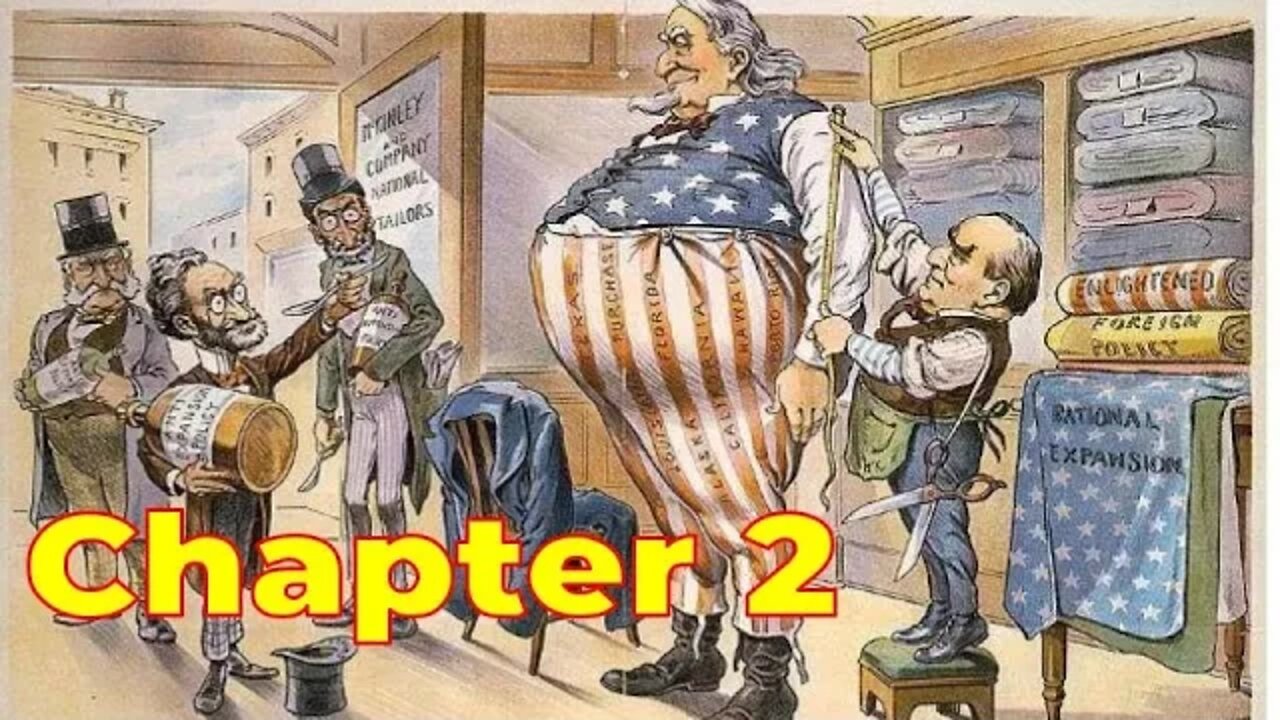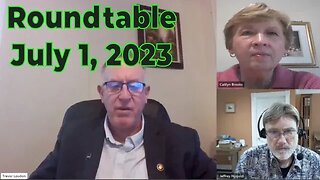Premium Only Content

Turning Illiberal – Chapter 2 – Illiberal Reformers – Thomas C. Leonard
Part 1: The Progressive Ascendancy
Chapter 2: Turning Illiberal
Subsections of Chapter 2:
PROFESSIONALIZING BY PROFESSING ECONOMICS 18
THE END OF THE AUTONOMOUS INDIVIDUAL 21
THE WISE MINORITY AND THE MORAL WHOLE 24
The book can be read in conjunction with Antony Sutton's book on how Skull and Bones took control of education in the US (https://www.youtube.com/playlist?list=PL8ZqEN0xwCfPp2N2OL2p_RLEbYhS4tGcD), with James Burnham's 'Managerial Revolution', and with Samuel T. Francis' 'Leviathan and Its Enemies'.
Published: January 12th 2016
Buy: https://www.amazon.de/Illiberal-Reformers-Eugenics-Economics-Progressive-ebook/dp/B0131KW616/
If you like, you can support my work here. It would be appreciated greatly.
Paypal: paypal.me/mario1337
BTC: 35iDtUzZq33CoJhmK38TdV9Xunvs7TKmzX
ETH: 0xf396A0e10911b4BC975CfE80117412D484B24d1e
Lecture by Leonhard on his book: https://www.youtube.com/watch?v=ImgWWfCYmoI
Chapter 2 Notes
1. Joseph Dorfman (1955) "The Role of the German Historical School in American Economic Thought." American Economic Review 55(2): 17-28. Jurgen Herbst (1965) The German Historical School in American Scholarship: A Study in the Transfer of Culture. Ithaca, NY: Cornell University Press. Axel Schäfer (2000) American Progressives and German Social Reform 1875-1920. Daniel Rodgers (1998) Atlantic Crossings: Social Politics in a Progressive Age., pp. 76-111.
2. In 1906, Henry Farnam of Yale University polled America's leading economists to ascertain the influence of German economic ideas. Of the 116 who replied, 59 had studied in Germany, and a larger number acknowledged influence. Of several influential German professors, Wagner and Schmoller had the most American students, Farnam was a student of Schmoller's. See Benny Carlson (1999) “Wagner's Legacy in America: Re-opening Farnam's Inquiry." Journal of the History of Economic Thought 21(3): 289-310.
3. Richard T. Ely (1884) "The Past and Present of Political Economy." In Herbert B. Adams (ed.). Johns Hopkins University Studies in Historical and Political Science, Vol II, no. 3 Baltimore: Johns Hopkins University, p. 64.
4. Richard T. Ely (1883) French and German Socialism in Modern Times. New York:
B Harper Bros., pp. 236-37.
5. Fritz Ringer (1969) Decline of the German Mandarins: The German Academic Com. munity, 1890-1933. Cambridge, MA: Harvard University Press.
6. Nicholas W. Balabkins (1988) Not by Theory Alone ... The Economics of Gustav von Schmoller and Its Legacy to America. Berlin: Dunker & Humboldt, p. 38.
7. E W. Taussig (1885) *College Graduates in Germany." The Nation, April 2, p. 275. Cited in Dorfman, "The Role of the German Historical School in American Economic Thought. p. 22.
8. John B. Parrish (1967) "The Rise of Economics as an Academic Discipline: The Formative Years to 1900." Southern Economic Journal 34 (July): 1-16, p. 11.
9. A. W. Coats (1988) "The Educational Revolution and the Professionalization of American Economics." In William J. Barber (ed.), Breaking the Academic Mould: Economists and American Higher Learning in the Nineteenth Century. Middletown, CT: Wesleyan Uni. versity Press, pp. 340-75, pp. 342-43.
10. Alexandra Oleson and J. Voss (eds.) (1979) Organization of Knowledge in Modern America, 1860-1920. Baltimore: Johns Hopkins University Press, p. xii.
11. William James (1903) "The PhD Octopus." Harvard Monthly, March. 12. Parrish, “The Rise of Economics as an Academic Discipline," pp. 9-10. 13. Parrish, "The Rise of Economics as an Academic Discipline," pp. 9-10.
14. Thomas J. Haskell (1977) The Emergence of Professional Social Science: The American Social Science Association and the Nineteenth Century Crisis of Authority. Urbana: University of Illinois Press, p 24
15. Harvard's Quarterly Journal of Economics and Columbia's Political Science Quarterly appeared in 1886, the same year the AEA began publishing its monograph series.
16. Ely produced several textbooks. His Outlines of Economics was first published in 1893.
17. A. W. Coats (1985) "The American Economic Association and the Economics Profession." Journal of Economic Literature 23(4): 1697-1727, p. 1699.
18. Charles K. Adams was president of Cornell when the AEA organized in 1885, later leading Wisconsin.
19. This point is due to Roger L. Geiger (2004) To Advance Knowledge: The Growth of the American Research Universities
20. Fetter instanced "J. B. Clark, E.J. James, H. W. Farnam, S. N. Patten, R. T. Ely, A. T. Hadley, E.R.A. Seligman, A. W. Small, and F. W. Taussig; in the next decade, W.M. Daniels, H.B. Gardner, E. F. Gay, and others."
21. Richard T. Ely (1886) "Report on the Organization of the American Economic Association." Publications of the American Economic Association 1(1): 5-16, p. 20, note 1.
22. Ely, "Past and Present of Political Economy" p. 50.
Not enough space. See rest of notes in video.
#eugenics #history #economics
-
 56:07
56:07
Eugen Richter Audiobooks
2 years agoMutiny in Russia, War in Ukraine: A Panel Discussion • Jeff Nyquist, Trevor Loudon, Clare Lopez
540 -
 LIVE
LIVE
GamingWithHemp
2 hours agoDonkey Kong Bananza episode #2
96 watching -
 LIVE
LIVE
MadHouseRetro
4 hours agoMadhouse Presents : Kingdom Hearts Series. Pt. 1, Beaches and sunsets.
38 watching -
 2:23:40
2:23:40
Robert Gouveia
8 hours agoObama Traitors get CRIMINAL REFERRAL! Motion to UNSEAL! Rupert Murdoch SUED!
57.2K104 -
 LIVE
LIVE
GritsGG
7 hours agoWin Streaking! Most Wins 3100+! 🔥
219 watching -
 10:24
10:24
Zoufry
8 hours agoThe Building That Shouldn't Exist : Fort Boyard
49.8K15 -
 4:25:19
4:25:19
Grant Cardone
8 hours agoHow to Build Wealth in 2025 - Grant Cardone LIVE!
56.3K4 -
 3:03:03
3:03:03
I_Came_With_Fire_Podcast
15 hours agoEschatologist: This is EVIDENCE the Biblical END TIMES Are Coming Close
43.9K10 -
 2:55:04
2:55:04
Beyond_Bitz
3 days agoDeath Stranding - Part 3 - Mule Mercenaries & Electric Bicycles
35.1K -
 6:41:07
6:41:07
BBQPenguinn
6 hours ago $1.27 earnedNEW WIPE! Tasking & PVP
27.6K